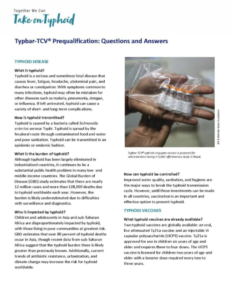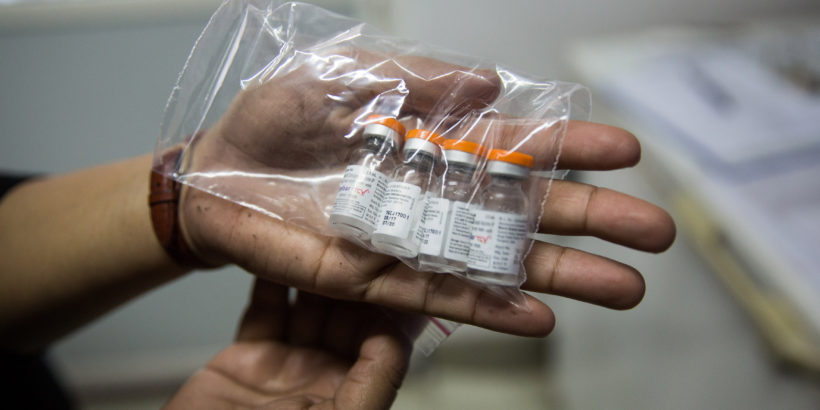TYPHOID DISEASE

What is typhoid?
Typhoid is a serious and sometimes fatal disease that causes fever, fatigue, headache, abdominal pain, and diarrhea or constipation. With symptoms common to many infections, typhoid may often be mistaken for other diseases such as malaria, pneumonia, dengue, or influenza. If left untreated, typhoid can cause a variety of short- and long-term complications.
How is typhoid transmitted?
Typhoid is caused by a bacteria called Salmonella enterica serovar Typhi. Typhoid is spread by the fecal-oral route through contaminated food and water and poor sanitation. Typhoid can be transmitted in an epidemic or endemic fashion.
What is the burden of typhoid?
Although typhoid has been largely eliminated in industrialized countries, it continues to be a substantial public health problem in many low- and middle-income countries. The Global Burden of Disease (GBD) study estimates that there are nearly 12 million cases and more than 128,000 deaths due to typhoid worldwide each year. However, the burden is likely underestimated due to difficulties with surveillance and diagnostics.
Who is impacted by typhoid?
Children and adolescents in Asia and sub-Saharan Africa are disproportionately impacted by typhoid, with those living in poor communities at greatest risk. GBD estimates that over 80 percent of typhoid deaths occur in Asia, though recent data from sub-Saharan Africa suggest that the typhoid burden there is likely greater than previously known. Additionally, current trends of antibiotic resistance, urbanization, and climate change may increase the risk for typhoid worldwide.
How can typhoid be controlled?
Improved water quality, sanitation, and hygiene are the major ways to break the typhoid transmission cycle. However, until these investments can be made in all countries, vaccination is an important and effective option to prevent typhoid.
TYPHOID VACCINES
What typhoid vaccines are already available?
Two typhoid vaccines are globally available: an oral, live attenuated Ty21a vaccine and an injectable Vi capsular polysaccharide (ViCPS) vaccine. Ty21a is approved for use in children six years of age and older and requires three to four doses. The ViCPS vaccine is licensed for children two years of age and older with a booster dose required every two to three years.
Are these vaccines safe and effective?
Studies show these two vaccines to be safe and to protect 50 to 80 percent of recipients. However, because neither vaccine gives lasting immunity or is approved for use in children younger than two years of age, they have limited potential health benefits. Neither vaccine is widely used in routine immunization programs or subsidized by Gavi, the Vaccine Alliance.
What are typhoid conjugate vaccines?
Newly available typhoid conjugate vaccines (TCVs) are made by linking (or “conjugating”) the Vi capsular polysaccharide to a more complex protein. Through conjugation, TCVs are able to stimulate parts of the immune system that the Vi polysaccharide vaccines cannot, thereby inducing a stronger, longer-lasting immunity among a broader age range.
What are the benefits of typhoid conjugate vaccines?
Compared to the currently available vaccines, TCVs have longer-lasting protection, require fewer doses, and are suitable for children younger than two years of age, allowing delivery through routine childhood immunization programs. Expanded use of TCVs through routine immunization has the potential to reduce the need for antibiotics, slow further emergence of drug-resistant typhoid strains, and save lives.
TYPBAR TCV®
What is Typbar TCV®?
Typbar TCV is a typhoid conjugate vaccine manufactured by Bharat Biotech International Limited. It contains purified Vi capsular polysaccharide of Salmonella enterica serovar typhi Ty2 conjugated to a tetanus toxoid carrier protein.
Who can receive Typbar TCV?
Typbar TCV can be administered to adults, children, and infants 6 months of age and older.
What is the dosage schedule for Typbar TCV?
One single 0.5 mL dose of Typbar TCV, injected intramuscularly, offers protection for at least 3 years to adults, children, and infants over 6 months of age. Further studies are needed to determine the duration of protection and need for booster doses.
Is Typbar TCV safe?
Clinical trials have shown Typbar TCV to be safe and well-tolerated.
Is Typbar TCV effective?
Studies have shown that Typbar TCV elicits a strong immune response in infants and adults.
What is the significance of being prequalified by the World Health Organization (WHO)?
Typbar TCV is the first TCV to be qualified by WHO. This allows the vaccine to be purchased by WHO, UNICEF, and other United Nations agencies and is an important step for inclusion in the Gavi investment strategy, which helps finance vaccine access in low-income countries. WHO announced this prequalification in January 2018.
Which countries are using Typbar TCV?
Typbar TCV is licensed for private use in India and Nepal but is not yet included in any countries’ national immunization programs.
Does Gavi support introduction of Typbar TCV?
Gavi has announced US$85 million in funding for Gavi-eligible countries to introduce TCVs in 2019 and 2020. Because Typbar TCV is the first WHO-prequalified TCV, it is currently the only typhoid vaccine eligible for introduction in Gavi-supported countries.
Photo Credit: Bill & Melinda Gates Foundation



